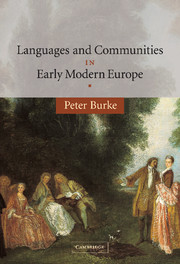Book contents
- Frontmatter
- Contents
- Acknowledgements
- Chronology 1450–1794
- Prologue: communities and domains
- 1 ‘Speak, that I may see thee’: the discovery of language in early modern Europe
- 2 Latin: a language in search of a community
- 3 Vernaculars in competition
- 4 Standardizing languages
- 5 Mixing languages
- 6 Purifying languages
- Epilogue: languages and nations
- Appendix: languages in Europe 1450–1789
- Bibliography
- Index
3 - Vernaculars in competition
Published online by Cambridge University Press: 07 December 2009
- Frontmatter
- Contents
- Acknowledgements
- Chronology 1450–1794
- Prologue: communities and domains
- 1 ‘Speak, that I may see thee’: the discovery of language in early modern Europe
- 2 Latin: a language in search of a community
- 3 Vernaculars in competition
- 4 Standardizing languages
- 5 Mixing languages
- 6 Purifying languages
- Epilogue: languages and nations
- Appendix: languages in Europe 1450–1789
- Bibliography
- Index
Summary
It has often been argued that the early modern period was one of the ‘emergence’, the ‘rise’ or the ‘triumph’ of the national vernaculars, at the expense of cosmopolitan Latin on the one hand and local dialects on the other. To the extent that this happened, the phenomenon was important for the creation of new ‘speech communities’ and eventually new trans-regional or super-regional loyalties. By 1750, the European linguistic system was very different from the medieval system, which had been divided between a living but non-classical Latin and regional dialects which were spoken rather than written.
However, the simple statement that the vernaculars of Europe ‘rose’ is a rather crude one. The short comparative survey which follows will attempt to offer some at least of the necessary distinctions, nuances and qualifications, as well as reflecting on the place in the history of different European vernaculars of the Renaissance, the Reformation, Absolutism (or at least the centralizing state), European expansion and the Enlightenment.
THE WHIG INTERPRETATION AND ITS PROBLEMS
The story of the rise of the vernaculars is one that has often been told in a triumphalist manner, notably in the cases of French and English, with a stress on their victory over Latin or their ‘emancipation’ in the course of the Renaissance and Reformation. We might call this version a ‘Whig’ history of language and compare it to the traditional but much-criticized story of the rise of the middle class.
- Type
- Chapter
- Information
- Languages and Communities in Early Modern Europe , pp. 61 - 88Publisher: Cambridge University PressPrint publication year: 2004
- 1
- Cited by

